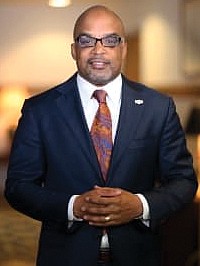VSU, other colleges dealing with changes because of COVID-19
George Copeland Jr. | 8/27/2020, 6 p.m. | Updated on 8/31/2020, 10:12 a.m.
Virginia State University officials announced this week that campus housing will not be reopened and all courses will remain online this fall to avoid the spread of COVID-19 — a prime example of the upheaval students, parents and schools are facing now that classes have begun.
VSU started the fall semester Aug. 17 using virtual classes, with a plan to allow students who had been tested for the coronavirus on campus for face-to-face classes beginning Sept. 14, but with smaller numbers in each class.
Suddenly, students who had paid deposits and rented apartments found out that the campus would be closed — a situation being repeated across the country at colleges and universities that hoped to reopen but are finding it too risky to do so in the face of the pandemic.
VSU President Makola M. Abdullah stated in a letter accompanying the announcement that university staff was ready to welcome students back to campus after having “worked tirelessly” to prepare for their safe return.
“However, we have determined that the implications and risks of returning to campus in the midst of this growing pandemic could potentially have harmful or even deadly ramifications,” Dr. Abdullah wrote.
He indicated Tuesday that the decision was made after seeing other schools like the University of North Carolina at Chapel Hill reopen and then abruptly shut down.
Dr. Abdullah noted that VSU serves a population that is at higher risk for COVID-19. “More than half of all cases and deaths are in the Black community,” he said, describing the decision as prudent given the “massive disruption that could happen if the campus had to shut down due to an outbreak.”
Still for VSU and other schools, going virtual means taking a financial hit. The lack of students paying for room and board means less money to repay bonds and other loans for construction of dorms and other buildings. Paying for contracts with food vendors also might require schools to tap reserves.
Other Richmond area schools continue offering a hybrid of virtual and face-to-face instruction while also supplying those who have returned with masks, hand sanitizer and disinfectant wipes. Many colleges also have made coronavirus testing data available to students, parents and the public, with some Virginia universities unveiling COVID-19 dashboards to track infections as students return to campus.
Virginia Commonwealth University released its first set of COVID-19 data on Aug. 20, starting with 36 total cases. On Wednesday, VCU was reporting 76 active cases — 63 students and 13 employees. In addition to posting information about positive tests, VCU is tracking students who live on campus and are in isolation or quarantine, though it does not break out the numbers based on dormitory location.
On Wednesday, the VCU dashboard indicated that 85 students were being quarantined and 53 were being isolated on campus — still a small fraction of the student body that in past years has topped 32,000 people on the academic and medical campuses.
VCU, though, is outpacing five Virginia universities in the number of positive cases, according to available testing data. The other schools are George Mason, Radford, the University of Richmond, Virginia Tech and the College of William & Mary.
In a public health advisory released last week, VCU pointed to a recent party as the source for eight cases, and warned that students hosting parties or gatherings with 10 or more people are subject to interim suspension.
“Gathering in large groups during a public health crisis is not acceptable and VCU does not encourage or condone these activities,” the university stated.
The University of Richmond also is posting COVID-19 data. The institution’s dashboard shows that 3,102 employees and students have been tested since July, with nine total cases and three active cases as of Wednesday. The private university also has said students who host large, off-campus gatherings will be at risk for suspension.
Some VCU faculty have raised concern about the hiring of Louisiana-based testing newcomer Kallaco Health & Technology to handle testing for the university, as well as for George Mason University and the College of William & Mary.
Last Friday, professors at George Mason alleged that tests sent to its students in July and August were not approved for self-administration by the FDA’s Emergency Use Authorization program.
William & Mary officials wrote in response that Kallaco confirmed “the test kits provided to students have been approved by the FDA for home collection.”
Meanwhile, Virginia Union University has made a transition to online-only instruction a key part of its reopening plan. The last day for classroom-based instruction is still set for Friday, Nov. 20. According to Pamela Cox, press secretary for VUU, there have been only three COVID-19 cases among VUU staff, faculty or students and only one person is currently in quarantine.
Noah Fleischman of the Capital News Services contributed to this article.







